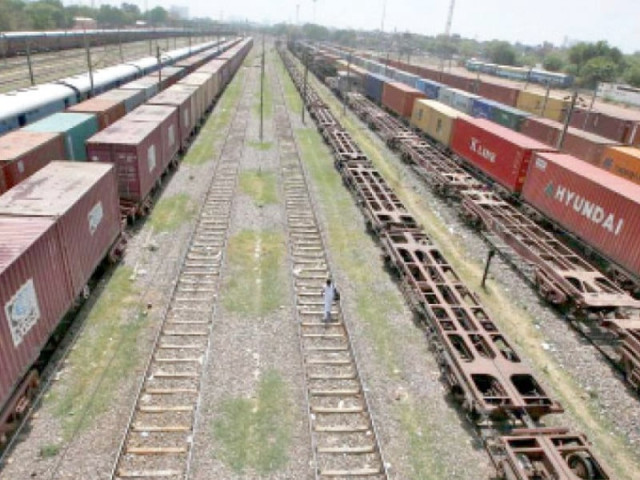ECNEC postpones $6.7b ML-I project
Approves new Gwadar airport, KKH projects amid financial concerns from China

Pakistan, on Saturday, deferred approval for the $6.7 billion Mainline-I (ML-I) project of the China-Pakistan Economic Corridor (CPEC), opting instead to sanction two other Chinese-funded schemes: building a new airport in Gwadar and completing a missing road link with multibillion-dollar investments. The decisions were made during a meeting of the Executive Committee of the National Economic Council (ECNEC), chaired by Deputy Prime Minister and Foreign Minister Ishaq Dar. ECNEC, mandated to approve projects costing over Rs7.5 billion, approved 19 projects, including some brought forward due to cost revisions.
ECNEC did not clear the re-modified PC-I for the ML-I upgrade and advised Pakistan Railways to consider preparing smaller projects and packages for financing and implementation, according to a Foreign Office press statement. The coalition government had previously cleared the “unviable” $6.7 billion ML-I project before Prime Minister Shehbaz Sharif’s visit to China. The initial approval came despite the Ministry of Finance noting that the scheme conflicted with the goals of the next International Monetary Fund (IMF) loan programme.
Sources indicated that during PM Sharif’s visit, Chinese officials advised Pakistan to complete the project in phases due to the significant financing needs and Pakistan’s limited capacity for major foreign loans. The government had pushed the ML-I project despite doubts about allocating Rs250 billion annually to complete the $6.7 billion (Rs1.93 trillion) project over eight years. Beijing had previously asked for the project cost to be reduced by one-third to $6.7 billion, but this reduction made the project unviable, according to Planning Commission officials. The Planning Commission had termed the project unviable due to compromises on speed limits, line capacity, rolling stock, axle load, and the deletion of the fencing plan. The original ML-I track was 1,872 km long, but the Ministry of Railways now proposes rehabilitating a 1,726 km track.
However, ECNEC approved two other CPEC projects. “Among the projects falling under CPEC, the forum cleared the re-alignment of the Karakoram Highway between Thakot and Raikot at a rationalised cost of RMB13.067 billion and the revised PC-I of the New Gwadar International Airport,” according to the Foreign Office. The new Gwadar airport is scheduled to become operational within the calendar year.
In dollar terms, the Karakoram Highway (KKH) project cost is $2 billion. The KKH, originally built with China’s help 50 years ago, saw numerous fatalities during its construction due to the challenging terrain. A fully functional, all-weather KKH is crucial for China-Pakistan economic and commercial relations. This is the third major road infrastructure project under CPEC, following the Multan-Sukkur motorway and the Havelian-Thakot section of the KKH.
The KKH project includes upgrading the highway from Thakot to Dasu with a bypass road, exclusive relocation of the KKH at Dasu Dam by WAPDA, upgrading the road from Sazin to Thor Nullah & R-1, and new construction of the KKH after Basha. The project will be completed in five years, said the planning ministry. ECNEC also approved the construction of the New Gwadar International Airport (NGIA) at over Rs60 billion. The project was initially approved in January 2010 at an estimated cost of Rs7.6 billion, which has since been revised twice: to Rs22.9 billion in January 2015 and to Rs51.3 billion in November 2021.
To expedite the reconstruction and rehabilitation of flood-affected areas in Balochistan, the forum approved sub-components of the $400 million World Bank-funded Integrated Flood Resilience and Adaptation Programme (IFRAP). This includes $155 million for housing reconstruction, $50 million for road infrastructure, $40 million for livelihoods, and $30 million for irrigation infrastructure. An amount of Rs11.2 billion has been allocated in PSDP2024-25 for reconstruction projects in Balochistan.
Several projects in Sindh were also approved, including the revised Flood Response Emergency Housing Project at Rs296 billion, with Rs50 billion committed by the federal government. An amount of Rs30 billion has been allocated in PSDP2024-25 as the federal share for housing reconstruction in Sindh.
Dar informed ECNEC that the federal government remains committed to providing its share in Sindh’s housing reconstruction efforts. Other Sindh projects approved included the Karachi Water and Sewerage Services Improvement Project Phase-II and Competitive and Liveable City of Karachi.
ECNEC also cleared the revised PC-I of the operationalisation of Green Line BRTS in Karachi at a rationalised cost of Rs13.5 billion while suggesting that the Sindh government consider increasing the fare to reduce the subsidy borne by the federal government. Additionally, the forum approved the rehabilitation and reconstruction of an 86-km stretch of the national highway (N-5) between Moro and Ranipur, electrical and mechanical works and allied buildings for Lowari tunnel at Rs33.3 billion, and the 48 MW Jagran hydro power station at Rs14 billion.
ECNEC extended the Sehat Sahulat Programme until the end of December 2024, directing the Ministry of National Health Services to submit recommendations by September 15 for shifting the programme to the current budget, improving fiscal sustainability, and reforming the regulatory and monitoring framework.
The forum also approved the PM’s Programme for Elimination of Hepatitis C Infection at a cost of Rs68.3 billion, to be shared equally between the federal government and provinces. The Ministry of National Health Services was tasked to prepare an implementation plan with well-defined targets and measurable indicators within three months. ECNEC directed the Planning Commission to review the PSDP, considering the shrinking fiscal space and ensuring the timely completion of ongoing projects. These approvals underscore the government’s commitment to expediting economic development, rehabilitation, and improving the lives of citizens across Pakistan.



















COMMENTS
Comments are moderated and generally will be posted if they are on-topic and not abusive.
For more information, please see our Comments FAQ